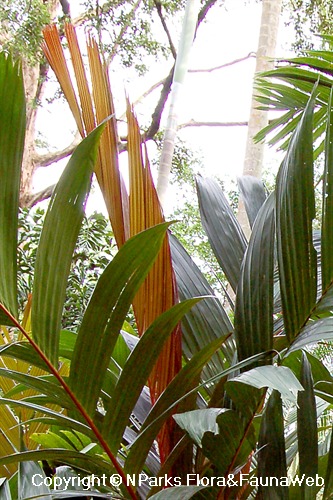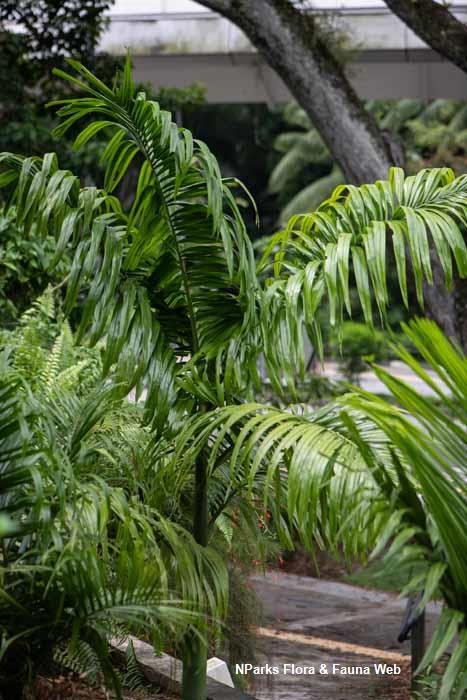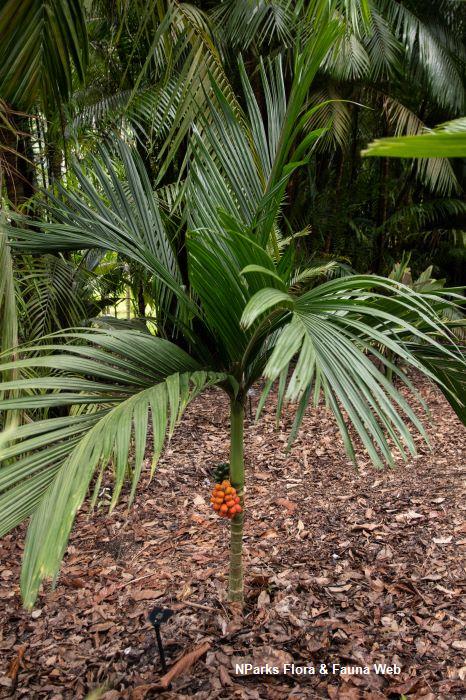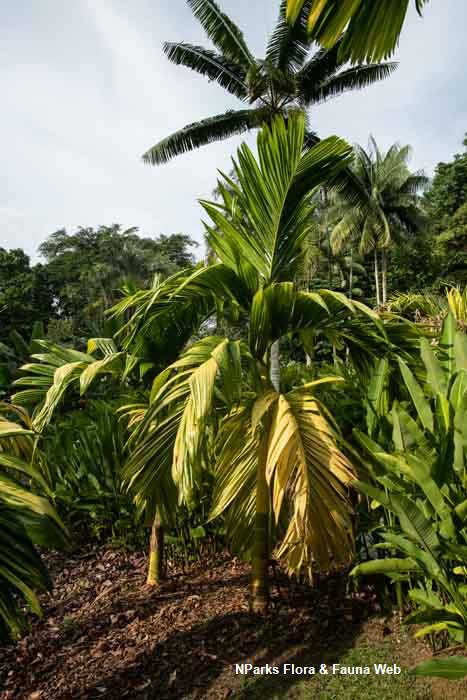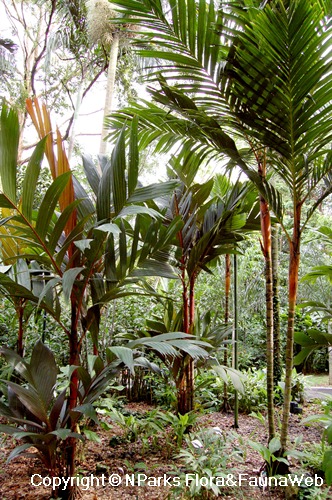
Back
Areca vestiaria
| Family Name: | Arecaceae (Palmae) |
| Synonyms: | Areca langloisiana |
| Common Name: | Orange Crownshaft Palm, Pinang Yaki, Pinang Merah, Orange Collar Palm, Sunset Palm |
Name
Classifications and Characteristics
| Plant Division | Angiosperms (Flowering Seed Plants) (Monocotyledon) |
|---|---|
| Plant Growth Form | Palm (Solitary Habit, Clustered Habit) |
| Mode of Nutrition | Autotrophic |
| Maximum Height | 9 m |
| Maximum Plant Spread / Crown Width | 5 m |
| Tree or Palm – Trunk Diameter | 10 cm to 12 cm |
Biogeography
| Native Distribution | Indonesia |
|---|
Description and Ethnobotany
| Growth Form | A stunning, solitary, sometimes clumping, slender, short to medium-sized, understorey palm with brilliant orange to reddish crownshaft, contrasted against thick, broad, glossy, pinnate, dark green fronds. |
|---|---|
| Trunk | Stem solitary, sometimes clumping, slender, smooth, 10 to 12 cm thick, light grey, prominently ringed with old leaf scars, often with stilt roots at the base; crownshaft orange to red, smooth. |
| Foliage | Fronds glossy, pinnate, largely-segmented, up to 2.1 m long; petiole yellow to orange, unarmed. |
| Others - Plant Morphology | Flower: Inflorescences cream, clustered on short flower stalks; female flowers larger but lesser than than of male flowers, first turn light green, then to dirty brown after fertilisation. Fruit: Infructescence bears 25 to 300 fruits; fruits ovoid, single-seeded, edible, about 2.5 cm in diameter, ripening to orange or red. |
| Cultivation | It is a shade-loving palm that requires frequent moisture, indirect sunlight and high humidity. It prefers moist soils that are well-draining though it can tolerate most soil types. Plant cannot tolerate dry out between waterings. Propagate by suckers or seeds. Seeds germinate within 6 to 8 weeks. |
| Etymology | The genus epithet 'Areca' is derived from a name used by local people on the Malabar coast of India to describe one of the species of this particular genus. Species epithet refers to 'clothed' or 'wrapped', which seems to suggest its beautiful bright orange or red crownshaft as a clothing or wrapping. |
| Ethnobotanical Uses | Others: Edible fruits are traditionally treated as a food source. |
Plant Care and Propagation
| Light Preference | Semi-Shade, Full Shade |
|---|---|
| Water Preference | Moderate Water |
| Plant Growth Rate | Moderate |
Foliar
| Foliage Retention | Evergreen |
|---|---|
| Mature Foliage Colour(s) | Green |
| Mature Foliage Texture(s) | Glossy / Shiny |
| Prominent Young Flush Colour(s) | Orange |
| Foliar Shape(s) | Palm Fronds (Pinnate / Feather) |
| Foliar Venation | Parallel |
| Leaf Area Index (LAI) for Green Plot Ratio | 4.0 (Palm - Cluster) |
Non - Foliar and Storage
| Trunk Type (Palm) | Solitary Habit, Aboveground, Clustering Habit |
|---|
Floral (Angiosperm)
| Flower Colour(s) | Cream / Off-White |
|---|
Fruit, Seed and Spore
| Mature Fruit Colour(s) | Orange, Red |
|---|
Image Repository
Others
| Master ID | 1297 |
|---|---|
| Species ID | 2590 |
| Flora Disclaimer | The information in this website has been compiled from reliable sources, such as reference works on medicinal plants. It is not a substitute for medical advice or treatment and NParks does not purport to provide any medical advice. Readers should always consult his/her physician before using or consuming a plant for medicinal purposes. |

